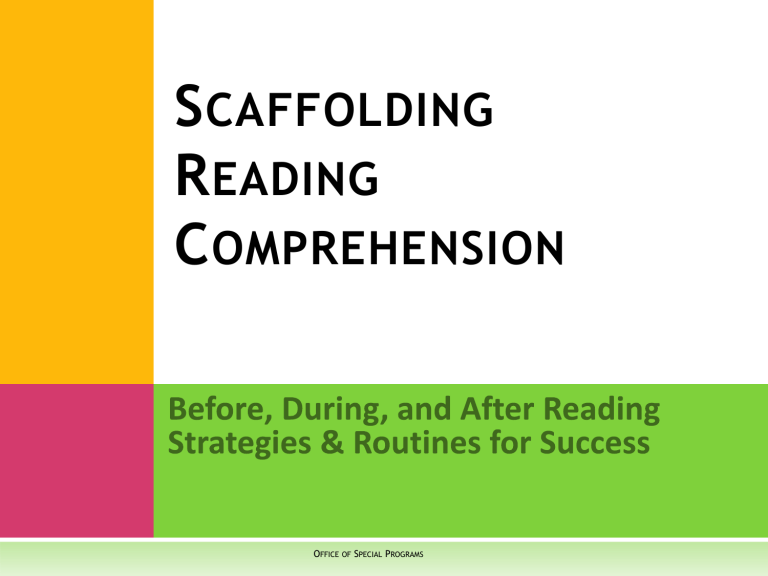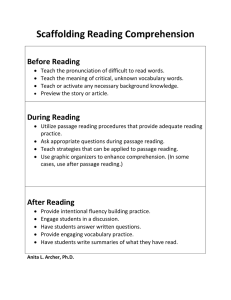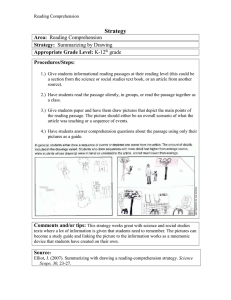Scaffolding Reading Comprehension: Elementary Grades
advertisement

S CAFFOLDING R EADING C OMPREHENSION OFFICE OF SPECIAL PROGRAMS Before During After Comprehension is the process of simultaneously extracting and constructing meaning through interaction and involvement with written language. It consists of three elements: The reader The text The activity or purpose for reading (Rand Reading Study Group, 2002) OFFICE OF SPECIAL PROGRAMS, EXTENDED AND EARLY LEARNING What should happen before, during and after reading? OFFICE OF SPECIAL PROGRAMS, EXTENDED AND EARLY LEARNING S CAFFOLDING READING IN THE ELEMENTARY GRADES The Scaffolding Reading in the Elementary Grades modules provide the instructional routines and strategies teachers need to help students extract and construct meaning. OFFICE OF SPECIAL PROGRAMS, EXTENDED AND EARLY LEARNING B EFORE Module Contents READING Teach the pronunciation of difficult to read words Teach the meaning of critical, unknown vocabulary words Teach or activate any necessary background knowledge Preview the story or the article OFFICE OF SPECIAL PROGRAMS, EXTENDED AND EARLY LEARNING D URING Module Contents READING Utilize passage reading procedures that provide adequate reading practice Ask appropriate questions during passage reading Teach strategies that can be applied to passage reading Use graphic organizers to enhance comprehension OFFICE OF SPECIAL PROGRAMS, EXTENDED AND EARLY LEARNING A FTER Module Contents READING Provide intentional fluency building practice Engage students in a discussion Have students answer written questions Provide engaging vocabulary practice Have students write summaries of what they have read OFFICE OF SPECIAL PROGRAMS, EXTENDED AND EARLY LEARNING S NAPSHOTS OF THE INSTRUCTIONAL PRACTICES AND ROUTINES OFFICE OF SPECIAL PROGRAMS, EXTENDED AND EARLY LEARNING B EFORE READING OFFICE OF SPECIAL PROGRAMS, EXTENDED AND EARLY LEARNING B EFORE BIG IDEA READING If students can read the words in a passage accurately and fluently, their reading comprehension will be enhanced. OFFICE OF SPECIAL PROGRAMS, EXTENDED AND EARLY LEARNING T EACH THE PRONUNCIATION OF DIFFICULT TO READ WORDS . Procedures for telling the word(s). This word is ____________________ . What word _____________________? Spell and read the word. _________________ focus inspector OFFICE OF SPECIAL PROGRAMS, EXTENDED AND EARLY LEARNING glimpse spectator A S TRATEGY M ODELED Decoding Instruction, 1st Grade OFFICE OF SPECIAL PROGRAMS, EXTENDED AND EARLY LEARNING BIG IDEA If students understand the meaning of critical vocabulary in the passage, their comprehension will be enhanced. OFFICE OF SPECIAL PROGRAMS, EXTENDED AND EARLY LEARNING T EACH THE MEANING OF CRITICAL , UNKNOWN WORDS Tier One: Basic words Tier Two: Words in general use, but not common Chair, bed, happy, house Concentrate, absurd, fortunate, relieved, dignity Tier Three: Rare words limited to a specific domain Tundra, igneous rocks, weathering OFFICE OF SPECIAL PROGRAMS, EXTENDED AND EARLY LEARNING K EY CONCEPTS IN TEACHING CRITICAL , UNKNOWN WORDS Select words that are unknown and critical to passage understanding. Select words students are likely to encounter in the future Tier 2 words Academic vocabulary Student-friendly explanations OFFICE OF SPECIAL PROGRAMS, EXTENDED AND EARLY LEARNING E XAMPLE : TEACHING CRITICAL , UNKNOWN WORDS Select three words for robust explicit instruction. Reading Level: 2nd Series: Harcourt Trophies Passage: Lemonade for Sale announced members neighborhood arrived rebuild lemonade glum squawked clubhouse OFFICE OF SPECIAL PROGRAMS, EXTENDED AND EARLY LEARNING S TUDENT - FRIENDLY EXPLANATIONS Dictionary Definition Relieved – (1) to free wholly from pain, stress, pressure. (2) to lessen or alleviate, as pain or pressure Student Friendly Explanation When something that is difficult is over or never happened at all, you feel relieved. OFFICE OF SPECIAL PROGRAMS, EXTENDED AND EARLY LEARNING S TUDENT FRIENDLY DEFINITIONS Dictionary Definition Disgusting – to cause to feel disgust; be sickening, repulsive, or very distasteful to Fragile – easily broken, damaged, or destroyed Gratitude – a feeling of thankful appreciation for favors or benefits received Loitering- to linger in an aimless way; spend time idly OFFICE OF SPECIAL PROGRAMS, EXTENDED AND EARLY LEARNING Student-Friendly Definition A CTIVITY: CREATING STUDENT FRIENDLY EXPLANATIONS Gape - to open the mouth wide involuntarily, as the result of hunger, sleepiness, or absorbed attention Glimpse – 1) momentary or slight appearance, 2) a vague idea; inkling. Scrutinize - to examine in detail with careful or critical attention OFFICE OF SPECIAL PROGRAMS, EXTENDED AND EARLY LEARNING C OLLINS C OBUILD S TUDENT D ICTIONARY http://www.elearnaid.com/coconewstdis.html A S TRATEGY Vocabulary Instruction, 2nd Grade OFFICE OF SPECIAL PROGRAMS, EXTENDED AND EARLY LEARNING BIG IDEA If students have the background knowledge required by a passage, their comprehension will be enhanced. OFFICE OF SPECIAL PROGRAMS, EXTENDED AND EARLY LEARNING T EACH OR ACTIVATE NECESSARY BACKGROUND KNOWLEDGE . Strategy #3 Example Prior to passage reading, select and read aloud a book that provides necessary background knowledge Passage: Me and Uncle Romie Background knowledge needed: Life in a big city OFFICE OF SPECIAL PROGRAMS, EXTENDED AND EARLY LEARNING A CTIVATING B ACKGROUND K NOWLEDGE Activate background knowledge using a research validated strategy Ask students questions and engage in a discussion Brainstorm the Activate topics/questions knowledge using that might be the KWL strategy covered OFFICE OF SPECIAL PROGRAMS, EXTENDED AND EARLY LEARNING BACKGROUND KNOWLEDGE B-K-W-L-Q Background Knowledge What we want Language to know needed for writing Questions we can now answer Front load, front load, front load!! (Adapted from Ogale’s KWL by J. Allen) OFFICE OF SPECIAL PROGRAMS, EXTENDED AND EARLY LEARNING BIG IDEA If students preview a passage, their comprehension is enhanced. OFFICE OF SPECIAL PROGRAMS, EXTENDED AND EARLY LEARNING D URING READING OFFICE OF SPECIAL PROGRAMS, EXTENDED AND EARLY LEARNING BIG IDEA Asking students questions during passage reading has proven effectiveness in improving the comprehension of students. OFFICE OF SPECIAL PROGRAMS, EXTENDED AND EARLY LEARNING Q UESTIONING THE AUTHOR : A N APPROACH FOR ENHANCING STUDENT ENGAGEMENT WITH TEXT ( B EC K , M C K EOWN , H AMILTON & K UC AN , 1 9 9 7) Comprehension strategy to teach students to construct meaning during reading Queries, or discussion questions, encourage students to engage with ideas in text to build meaning Queries help teachers facilitate group discussion and student-to-student interaction OFFICE OF SPECIAL PROGRAMS, EXTENDED AND EARLY LEARNING Q UERY EXAMPLES What is the author trying to say? Why do you think the author used the following phrase? Does this make sense to you? OFFICE OF SPECIAL PROGRAMS, EXTENDED AND EARLY LEARNING BIG IDEA Instruction in specific cognitive strategies can improve reading comprehension for all students and, most particularly, can assist struggling readers. (RAND Reading Study Group, 2002) OFFICE OF SPECIAL PROGRAMS, EXTENDED AND EARLY LEARNING C OGNITIVE STRATEGIES Competent Readers Strategies Text Structure Strategies Fix-Up Strategies Reread Look back Read ahead Restate in your own words OFFICE OF SPECIAL PROGRAMS, EXTENDED AND EARLY LEARNING BIG IDEA The ability to identify and take advantage of text organization can contribute to students’ comprehension. (Dickson, Simmons, & Kameenui, 1998) OFFICE OF SPECIAL PROGRAMS, EXTENDED AND EARLY LEARNING T EXT Story Grammar ORGANIZATION Title, author, setting, main characters, conflict resolution, events, conclusion Patterns of Expository Text Each paragraph is a body of knowledge Determine topic of paragraph Determine critical supporting details OFFICE OF SPECIAL PROGRAMS, EXTENDED AND EARLY LEARNING S TRATEGY E XAMPLE Paragraph Shrinking Name the who or what. Tell the most important thing about the who or what. Say the main idea in 10 words or less. OFFICE OF SPECIAL PROGRAMS, EXTENDED AND EARLY LEARNING BIG IDEA The main effect of graphic organizers appears to be on the improvement of the reader’s memory for the content that has been read. (Dickson, Simmons, & Kameenui, 1998) OFFICE OF SPECIAL PROGRAMS, EXTENDED AND EARLY LEARNING G RAPHIC ORGANIZERS Narrative Text (Story Maps) Expository Text (Flow charts, compare/contrast) OFFICE OF SPECIAL PROGRAMS, EXTENDED AND EARLY LEARNING A FTER READING OFFICE OF SPECIAL PROGRAMS, EXTENDED AND EARLY LEARNING BIG IDEA Fluency is related to reading comprehension. (Cunningham & Stanovich, 1998; Fuchs, Fuchs, & Maxwell, 1988) OFFICE OF SPECIAL PROGRAMS, EXTENDED AND EARLY LEARNING FLUENCY Repeated Reading Cold-timing Accuracy Practice Fluency Building Hot-timing OFFICE OF SPECIAL PROGRAMS, EXTENDED AND EARLY LEARNING BIG IDEA Engaging students in a discussion can increase their depth of text processing and subsequent comprehension. OFFICE OF SPECIAL PROGRAMS, EXTENDED AND EARLY LEARNING DISCUSSION Teach discussion behavior. Looks Like Sounds Like Facing peers Using a pleasant voice Making eye contact Sharing opinions and supporting facts Participating Sharing positive comments Listening Staying on topic OFFICE OF SPECIAL PROGRAMS, EXTENDED AND EARLY LEARNING BIG IDEA Writing about what you have read can improve your comprehension. Expressing your ideas in writing helps the reader organize ideas. OFFICE OF SPECIAL PROGRAMS, EXTENDED AND EARLY LEARNING BIG IDEA Writing about what you have read can improve your comprehension. Expressing your ideas in writing helps the reader organize ideas. OFFICE OF SPECIAL PROGRAMS, EXTENDED AND EARLY LEARNING Students must Read, And read, And read, And read, And read some more! OFFICE OF SPECIAL PROGRAMS, EXTENDED AND EARLY LEARNING WVDE L ESSON PLAN TEMPLATE Reading Lesson Plan OFFICE OF SPECIAL PROGRAMS, EXTENDED AND EARLY LEARNING C ONTACT I NFORMATION Phyllis Veith, Assistant Director, Office of Special Programs pveith@access.k12.wv.us Linda Palenchar, Coordinator, Office of Special Programs lpalench@access.k12.wv.us OFFICE OF SPECIAL PROGRAMS, EXTENDED AND EARLY LEARNING


